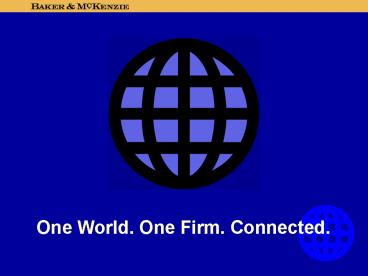One World. One Firm. Connected. - PowerPoint PPT Presentation
1 / 20
Title:
One World. One Firm. Connected.
Description:
... Australian Privacy ... How privacy is protected under Common Law. Different models of ... Increasingly, Australians expect that their privacy should be ... – PowerPoint PPT presentation
Number of Views:66
Avg rating:3.0/5.0
Title: One World. One Firm. Connected.
1
One World. One Firm. Connected.
2
Privacy
- Tim Dixon
- Baker McKenzie Sydney
- Chair, Australian Privacy Foundation
- National Scholarly Communications Forum Round
Table on Privacy - August 9 2002
3
Overview
- What privacy is about
- How privacy is protected under Common Law
- Different models of privacy legislation
- Privacy in Australia
- Privacy legislation in the electronic age
4
Privacy has become a significant human rights
issue
- Privacy is an important issue to consumers
- Increasingly, Australians expect that their
privacy should be respected by any organisation
they deal with - Consumers especially dislike intrusive marketing
practices and sharing of personal information
5
New insights into the extent of privacy concerns
- Privacy Commissioners Community attitudes
research project July 2001 - Around 9 in 10 people want control of their
personal information - 42 have refused to deal with a business because
of privacy concerns - 14 say they have refused to deal with government
agencies - Most sensitive information is financial details
(59), income (42), health (25)
6
(No Transcript)
7
Global framework
- Australia is one of the last industrialised
countries to implement privacy law - Privacy is recognised in international human
rights instruments - ICCPR, UN Declaration of Human Rights
- 1980 OECD Guidelines
- European Convention on Human Rights, EU Directive
8
Changing legal context of privacy in Australia
- No general right of privacy
- Privacy Act 1988 has covered Commonwealth
agencies since 1989 - Privacy Amendment (Private Sector) Act 2000 came
into effect December 2001 - general coverage of private sector and
non-government organisations - New state privacy laws in Victoria and NSW
- coverage of universities
9
Privacy Amendment (Private Sector) Act 2000
- Applies to organisations, defined broadly
- Covers the handling of personal information (ie
identifying or potentially identifying
information) in a record that is not generally
available - Requires compliance with National Privacy
Principles
10
Important caveats!
- Anything authorised by law almost always
overrides privacy principles - Law enforcement activities override privacy
principles - Privacy agencies are generally not well funded
- Broad exemptions exist
- Enforcement powers are limited
11
Enforcement
- Allows for development of industry codes
- Complaints go to Privacy Commissioner (or to code
administrator) - PC can review a code authority decision
- Variety of measures available, including
unlimited monetary compensation - Most complaints likely to be resolved without
payouts
12
A look at the National Privacy Principles
- Please note
- These are general principles
- There are lots of exceptions
- There are lots of references to what is
reasonable and practicable - There is a long history of interpreting privacy
principle overseas which will avoid absurd
outcomes
13
NPP 1 Collection
- Organisations must inform individuals of their
information practices when they collect personal
information - Collection must be lawful and fair and not
unreasonably intrusive - Collection should be from the individual and not
a third party
14
NPP 2 Use and disclosure
- Information should only be used for a secondary
purpose if - the individual gives consent, or
- the use is related to the primary purpose of
collection and it is within the reasonable
expectations of the individual
15
NPP 3, 4 Data quality and security
- Information must be kept accurate, complete and
up to date - Organisations must take reasonable steps to keep
information secure - Organisations should de-identify information if
there is no reason to maintain identifiable
information any longer
16
NPP 5 Openness
- Organisations must have a privacy policy
- Privacy policy must explain how the organisation
manages personal information - The policy must be made available on request
17
NPP 6 Access and correction
- Organisations must allow individuals access to
their personal information and a right to correct
it - Exceptions for
- frivolous or vexatious requests
- it relates to a commercially sensitive decision
making process - several other situations
18
NPP 9 Transborder data flows
- Information should only be transferred overseas
if - the individual consents, or
- the information is protected by contract or law,
or - the transfer is necessary to perform a contract,
or - other exceptional conditions apply
19
NPP 10 Sensitive information
- Special provisions apply to a class of sensitive
information - eg information relating to union membership,
health, sexual preference, religious belief - Individual consent, legal requirement or other
exceptional conditions are required before this
information is collected
20
The future
- Privacy will be to the information economy of
the next century what consumer protection and
environmental concerns have been to the
industrial society of the 20th century. - Marc Rotenburg, Director,
- Electronic Privacy Information Centre (US)































